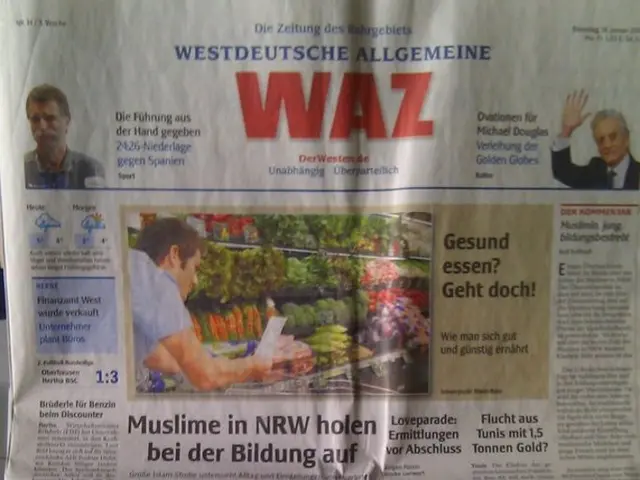Redefining Data Management: CEO Johanna Cabildo's Innovative Approach to AI Through Decentralization
Fresh Take:
Hear it straight from the horse's mouth! We caught up with Johanna Cabildo, the firebrand CEO of Data Guardians Network (D-GN), fresh off a whirlwind week at Token2049 in Dubai, where discussions about AI's backbone, data, reached an all-time high. With a flurry of meetings with industry giants, emerging start-ups, and thought leaders, Johanna sounded the alarm bell loud and clear: today's AI, the most influential yet, is built on a shady foundation of exploitation.
D-GN, Johanna's brainchild, is a game-changing answer. By reimagining data labeling as a fun, rewarding task, they're turning everyday folks into the architects of tomorrow's AI. From farmers in remote villages to refugees in camps, everyone can leverage their smartphones and earn real money, shaping the face of AI for the better.
In this explosive interview, Johanna rips the cloak off Big Tech's underhanded practices, underscores the dangers of centralized AI, and outlines D-GN's blueprint for a fairer, more inclusive AI economy. From post-Token2049 reflections to a roadmap for investors and policymakers, prepare to shake up the status quo and join the revolution!
Q1. You've just wrapped up a wild week at Token2049 in Dubai-what were your standout moments or unexpected insights from the conference?
Token 2049 was an energy-charged event, packed with discussions about AI's potential future, and it was exhilarating to see the industry rally behind decentralized AI. The widespread excitement around D-GN and community-owned datasets marks a turning point, showing the world is ready for a more equitable, inclusive data economy.
Q2. How did conversations at Token2049 shape or validate D-GN's mission to decentralize AI training?
We were met with overwhelming support for our focus on gamified data tasks and our belief that data contributors deserve visibility, voice, and fair compensation. At D-GN, we're crafting a decentralized protocol that lets regular users earn USDT from labeling data while maintaining transparency and immutability in every action. The response was incredible, solidifying our conviction that we're steering the industry in the right direction.
Q3. You frequently call today's most powerful AI "built on exploitative foundations." Can you detail what this exploitation looks like in practice?
The exploitation occurs at two levels: (1) silent scraping of content-across art, blogs, photos, Reddit feeds, captchas, and more-all without consent or compensation, and (2) underpaid human labor-armies of people working in the shadows to label data under opaque contracts. We envision a solution where the power dynamics are more balanced, ensuring a fairer approach to AI training worldwide.
Q4. Which aspects of AI's current data sourcing do you find most alarming, and why?
What's most unsettling is the illusion of neutrality. Scraped content often reflects the biases of the loudest sources, and underpaid laborers working in silence erase the perspectives of those who shape the models. A flawed base results in flawed AI, worsening the lives of the very people it aims to serve. Unless we intervene, this bias becomes structural and inherently more destructive.
Q5. Who holds the power to decide what data gets included, and whose voices end up excluded?
Power currently resides with a select group of corporations that operate under the radar. Invisible hands make decisions on what content to scrape, what information is deemed unworthy or not useful, and what edge cases to ignore. This leaves marginalized communities, indigenous knowledge systems, and non-Western narratives out in the cold. It's crucial to challenge this exclusivity before it becomes automated.
Q6. How do opaque systems fuel misinformation, and what real-world harms have you witnessed?
AI models, loaded with biased and inaccurate information, confidently dispense false advice in various contexts, such as medical advice, legal judgments, and hiring decisions. Even more alarming is their tendency to reflect discriminatory assumptions baked into their training data. Bias at scale becomes structural and devastating, harming millions of lives.
Q7. What role does D-GN play in empowering everyday people to reclaim their role as data trainers?
At D-GN, we've developed a gamified, mobile-first platform that rewards everyday users for labeling data with immediate USDT payments. Accessible on even the most basic smartphones and low-bandwidth connections, you can participate from anywhere in the world, level up your skills, and watch your contributions reshape the future of AI.
Q8. What powerful example of community-driven data stewardship have you encountered so far?
For me, I love the work Mozilla Common Voice is doing. Focused on language research, this project harnesses crowdsourced data to support cross-cultural initiatives. We want to amplify such initiatives on a global scale, improving the biggest AI models and, at the same time, ensuring fair pay for data contribution.
Q9. How does D-GN's gamified labeling and tokenized rewards system turn unpaid labor into real income for people in rural areas or even refugees?
Our platform is designed to give a shot at AI development to anyone with a smartphone and internet connection. Users can quickly jump in, hatch their character, and engage in micro-tasks within a fun, gamified environment. Once tasks are completed, users earn real income in the form of USDT payments. Our in-app features-countless challenges, reputation points, and badges-keep users engaged, motivated, and committed to shaping tomorrow's AI.
Q10. How does blockchain-backed provenance and community governance in D-GN prevent the same exploitative practices it's fighting against?
Blockchain-backed provenance ensures every labeled data point is traceable to its creator, eliminating hidden labor. Community governance means major decisions are made collectively, putting power in the hands of those creating the data. D-GN doesn't seek to recreate a corporatized AI model; we're after a more inclusive, equitable future.
Q11. What steps are crucial to preventing "decentralized intelligence" from just being a glorified version of old power imbalances?
Transparency is paramount: every action, transaction, and vote is visible on the blockchain, fostering a open, accountable system. We also introduce reputation systems that reward consistent, quality contributions and lift up determined contributors. By focusing on empowerment rather than exploitation, we ensure a more equitable future for AI.
Q12. What progressive steps should investors, builders, and policymakers take right now to reshape the power dynamic?
Investors can fund ventures that make transparent, ethical data practices central objectives. Builders can place ethical considerations at the forefront of data pipelines, beginning with transparent practices and diverse contributor cohorts. Policymakers can recognize data contribution as real labor, creating legislation that mandates transparency and fairness.
Q13. What milestones should the AI community expect from D-GN in the next year?
In the upcoming year, we're moving from pilot to large-scale operations, launching our gamified platform and our Telegram mini-app to everyone. With this, we'll roll out standard text and image datasets, as well as rich voice, lip-sync, and video datasets. We've got several Fortune 500 companies already committed to sourcing ethical training data through D-GN, with our first integrations coming soon.
On the governance side, our community will elect its first stewards, giving contributors a direct say in decision-making and policy-making. Our goal for the next 12 months is to grow our early contributors to over 1 million people, proving that quality contributions can be an asset in shaping the future of AI.
Q14. What advice do you have for those intrigued by data stewardship but unsure of where to start?
Step in today. Connect with us on Telegram, engage with the team, join our early access list, and test your hand at a few micro-tasks. You don't need to be a tech whiz or data scientist; curiosity and personal experience are enough. The sooner you contribute, the faster your impact, rewards, and influence grow. Your unique language, culture, and perspective lie at the heart of ethical AI. Make your mark by jumping in and shaping AI's future with D-GN.
[1] Data Guardians Network, n.d. Home page. https://daminu.io[2] Cabildo, J. (2022, October 11). Empowering Communities Through Blockchain and AI, Forbes. https://www.forbes.com/sites/johannacabildo/2022/10/11/empowering-communities-through-blockchain-and-ai/?sh=495461937c3d[3] Token2049 Dubai, n.d. Official website. https://www.token2049.com/dubai
- Johanna Cabildo, the CEO of Data Guardians Network (D-GN), shared her insights from Token2049 in Dubai, where she witnessed a surge of interest in decentralized AI and support for community-owned datasets.
- Discussions at Token2049 confirmed D-GN's focus on gamified data tasks and fair compensation for contributors, solidifying the belief that a more equitable, inclusive data economy is on the horizon.
- Johanna emphasized the exploitative practices in today's AI industry, with instances like unauthorized content scraping and underpaid human labor, working under opaque contracts.
- Johanna finds the illusion of AI neutrality alarming, as scraped content often reflects biases and underrepresents marginalized communities, resulting in biased AI models.
- Power in current AI data sourcing rests with a select group of corporations, deciding what content to scrape and what information to exclude, marginalizing voices outside their reach.
- Opaque AI systems can lead to misinformation, contributing to real-world harms such as inaccurate medical advice, biased legal judgments, and discriminatory hiring practices.
- D-GN aims to empower everyday people to reclaim their roles as data trainers through a gamified, mobile-first platform where users can earn USDT for labeling data.
- Mozilla Common Voice is an example of successful community-driven data stewardship, focused on language research and cross-cultural initiatives.
- D-GN's gamified labeling system turned unpaid labor into real income for people in rural areas or refugees by offering immediate USDT payments for completed tasks.
- Blockchain-backed provenance and community governance in D-GN prevent exploitative practices by ensuring transparent, accountable systems and decision-making.
- Transparency, reputation systems, and an emphasis on empowerment rather than exploitation are crucial to prevent decentralized intelligence from reinforcing old power imbalances.
- Investors, builders, and policymakers can make a positive impact by funding ethical ventures, prioritizing transparency in data pipelines, and recognizing data contribution as real labor, respectively.
- D-GN plans to launch its gamified platform and mini-app, roll out standard text and image datasets, and collaborate with Fortune 500 companies, all within the next year.
- Johanna advises those interested in data stewardship to start now, engage with the D-GN team, test their hand at micro-tasks, and join the community to shape the future of AI.








